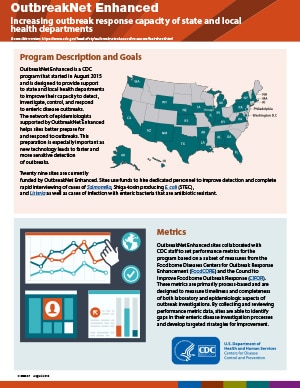About OutbreakNet Enhanced
OutbreakNet Enhanced is a CDC program that provides support to state and local health departments to improve their capacity to detect, investigate, control, and respond to enteric disease outbreaks. OutbreakNet Enhanced sites collaborate with each other and CDC to share experiences and insights that help improve enteric disease outbreak response. OutbreakNet Enhanced activities focus on improving detection and rapid interviewing of cases of Salmonella, Shiga toxin-producing Escherichia coli (STEC), and Listeria as well as any cases of enteric disease with pathogens that demonstrate antimicrobial resistance.
OutbreakNet Enhanced began in 2015 with 11 sites and has expanded to additional sites each year. Currently, 29 sites participate in the program. CDC plans to continue expanding the program over the next several years, if additional funding becomes available, so that more health departments receive enhanced support for enteric disease investigations. This expansion is designed to assist health departments in building capacity and preparing for new technologies, such as whole genome sequencing of pathogens, which will likely lead to an increased workload for state and local epidemiologists.
Why is OutbreakNet Enhanced important?
It is estimated that each year foodborne diseases cause illness in 1 in 6 Americans (or about 48 million people), resulting in 128,000 hospitalizations and 3,000 deaths.
Fast and effective outbreak investigations are needed to identify and remove contaminated food from the market to prevent additional illnesses. Identifying contaminated foods and learning how the contamination happened also help public health officials develop methods to prevent similar outbreaks in the future. However, many state health departments lack sufficient resources to conduct comprehensive enteric disease surveillance and rapid, coordinated detection and response to multistate outbreaks. OutbreakNet Enhanced aims to fill this gap by providing support to state and local health departments to improve their capacity to detect, investigate, control, and respond to enteric disease outbreaks.
What do OutbreakNet Enhanced sites do?
Sites improve enteric disease outbreak detection and response by:
- Hiring additional staff and students to conduct faster and more complete interviews for all laboratory-confirmed cases of Listeria, Shiga toxin-producing E. coli O157 (STEC), and Salmonella as well as any cases of enteric disease with pathogens that demonstrate antimicrobial resistance. Additional staff and students also increase the capacity for faster and more complete review of surveillance data and improved data sharing.
- Incorporating performance measures into their work plans. These measures are used to conduct process evaluations and identify areas for improvement in enteric disease investigations.
- Using the System for Enteric Disease Response, Investigation, and Coordination (SEDRIC), and the National Outbreak Reporting System (NORS) to improve multistate outbreak collaboration and the timeliness and completeness of enteric disease outbreak reporting.
- Working with an Integrated Food Safety Center of Excellence (CoE) to complete a project to improve outbreak surveillance and response in its jurisdiction. Each OutbreakNet Enhanced site chooses projects based on their needs and develops a partnership with a CoE based on its areas of expertise.
- Attending trainings and conferences to stay current on the latest developments and improvements in enteric disease surveillance and outbreak investigation.

If your agency is interested in joining OutbreakNet Enhanced, contact program staff at OPSCI@cdc.gov for more information about program requirements, eligibility, and applying through the Epidemiology and Laboratory Capacity (ELC) Cooperative Agreement.

Download a print version of the OutbreakNet Enhanced Fact Sheet pdf icon[PDF - 2 pages].